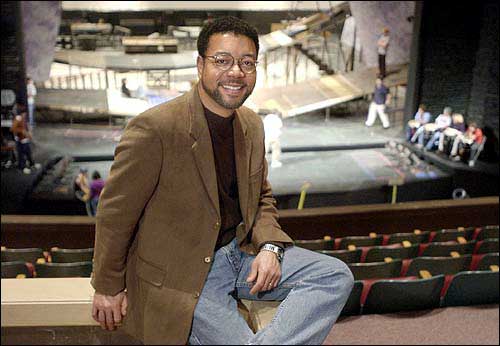‘Othello’ actor overcomes misperceptions about play
Actor Walter Coppage for years refused to read William Shakespeare’s “Othello.”
Until the 1970s and 1980s, the role of Othello the Moor was often played by white men wearing black makeup. To Coppage, it was a reminder of minstrel shows, which featured singers like Al Jolson in blackface.

Kansas City actor Walter Coppage will portray the lead in University Theatre's production of Othello.
“For the longest time, I wouldn’t read it because I thought it would be horribly racist,” he said. “I finally read it because I needed something for auditions, and someone suggested ‘Othello’ because of my deep voice. It’s an expectation of black actors who are classically trained to do it.”
After reading “Othello,” Coppage realized that Shakespeare, a 17th-century playwright, may have been ahead of his time in the way he viewed minorities.
“The way he deals with race relations is incredible,” he said. “He taps into the feeling of isolation and the cost of directing one’s culture and background.”
Coppage is playing the Moor in University Theatre’s production of “Othello,” which opens Friday in Crafton-Preyer Theatre in Murphy Hall. He was recruited for the part by KU theater professor Jack Wright, who was set to direct the play until he learned last semester that he needed triple-bypass surgery. Paul Meier, KU associate professor of theater, has taken over the director’s reins.
“I’m particularly enjoying working with Walter and watching him interact with the students involved,” Meier said. “He’s being a real mentor. He’s very generous and is enjoying working with the students just starting their careers.”
“Othello” opens in Venice, where Desdemona, the young daughter of a senator, has eloped with Othello the Moor, commander of the city’s armies. When Othello is named general of the defense forces against the Turks and sent to Cyprus, he receives permission to take his wife with him.
Othello’s doting love for Desdemona makes him an easy target for Iago, a man with a twisted intellect who envies and hates Othello. He begins to plant seeds of doubt and suspicion in Othello’s mind and hounds the commander into a fuming jealousy. Othello’s rage finally turns to murder and suicide.
Othello, Coppage said, did not start out as an “angry, bestial black man” a common depiction in film and on stage.
“Shakespeare takes a human being and places him in a situation that causes him to become that,” the actor said. “It’s a play as much about class as race. Othello is a commanding general, and Iago is on the lower rung. If Othello is bothered by racism, he is not bothered by classism.”
|
|||
While Othello might get top billing, Meier said the play is really Iago’s story.
“He is a dazzling villain evil incarnate a serpent a devil long before Hannibal Lector,” he said. “He doesn’t set out to be the devil, but Iago has given his life to Othello and he’s been ignored. He’s not crazy or insane. He is just mischievous at first, but is so intelligent and clever that he gets caught up in his own machinations with catastrophic results.”
Coppage is the first guest artist funded by the LeWan Alexander Spiritship, established by University Theatre in 1998 to honor Alexander, a KU alumnus and former faculty member.
Coppage has appeared in commercials, television movies and feature films. He has done voice-overs and is working on the “Batman” animated series. He is best known as the national television spokesman for Children International, an agency that helps impoverished children throughout the world.



